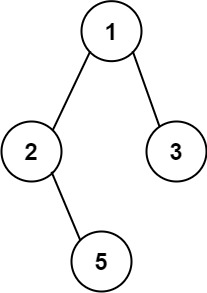LeetCode-in-Java
257. Binary Tree Paths
Easy
Given the root of a binary tree, return all root-to-leaf paths in any order.
A leaf is a node with no children.
Example 1:

Input: root = [1,2,3,null,5]
Output: [“1->2->5”,”1->3”]
Example 2:
Input: root = [1]
Output: [“1”]
Constraints:
- The number of nodes in the tree is in the range
[1, 100]. -100 <= Node.val <= 100
Solution
import com_github_leetcode.TreeNode;
import java.util.ArrayList;
import java.util.List;
/*
* Definition for a binary tree node.
* public class TreeNode {
* int val;
* TreeNode left;
* TreeNode right;
* TreeNode() {}
* TreeNode(int val) { this.val = val; }
* TreeNode(int val, TreeNode left, TreeNode right) {
* this.val = val;
* this.left = left;
* this.right = right;
* }
* }
*/
public class Solution {
private List<String> result;
private StringBuilder sb;
public List<String> binaryTreePaths(TreeNode root) {
result = new ArrayList<>();
if (root == null) {
return result;
}
sb = new StringBuilder();
walkThrough(root);
return result;
}
private void walkThrough(TreeNode root) {
assert root != null;
int length = sb.length();
sb.append(root.val);
length = sb.length() - length;
if (root.left == null && root.right == null) {
// leaf node.
result.add(sb.toString());
sb.delete(sb.length() - length, sb.length());
return;
}
sb.append("->");
length += 2;
if (root.left != null) {
walkThrough(root.left);
}
if (root.right != null) {
walkThrough(root.right);
}
sb.delete(sb.length() - length, sb.length());
}
}

